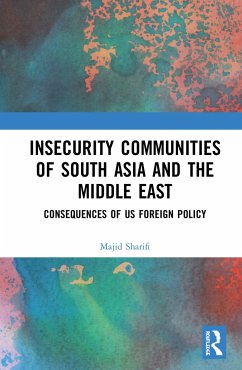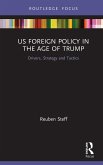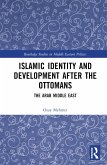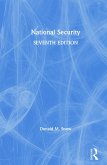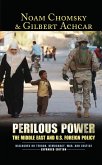Majid Sharifi
Insecurity Communities of South Asia and the Middle East
Consequences of US Foreign Policy
Majid Sharifi
Insecurity Communities of South Asia and the Middle East
Consequences of US Foreign Policy
- Gebundenes Buch
- Merkliste
- Auf die Merkliste
- Bewerten Bewerten
- Teilen
- Produkt teilen
- Produkterinnerung
- Produkterinnerung
This book critically examines how US foreign policy has produced a regional regime of instability and insecurity in South Asia and the Middle East.
Andere Kunden interessierten sich auch für
![The Middle East and the United States The Middle East and the United States]() David W. LeschThe Middle East and the United States194,99 €
David W. LeschThe Middle East and the United States194,99 €![The Transformation of the Gulf The Transformation of the Gulf]() The Transformation of the Gulf69,99 €
The Transformation of the Gulf69,99 €![US Foreign Policy in the Age of Trump US Foreign Policy in the Age of Trump]() Reuben SteffUS Foreign Policy in the Age of Trump64,99 €
Reuben SteffUS Foreign Policy in the Age of Trump64,99 €![Islamic Identity and Development after the Ottomans Islamic Identity and Development after the Ottomans]() Özay MehmetIslamic Identity and Development after the Ottomans149,99 €
Özay MehmetIslamic Identity and Development after the Ottomans149,99 €![The Rise of Anti-Americanism The Rise of Anti-Americanism]() Brendon O'Connor / Martin Griffiths (eds.)The Rise of Anti-Americanism168,99 €
Brendon O'Connor / Martin Griffiths (eds.)The Rise of Anti-Americanism168,99 €![National Security National Security]() Donald M. SnowNational Security228,99 €
Donald M. SnowNational Security228,99 €![Perilous Power Perilous Power]() Noam ChomskyPerilous Power122,99 €
Noam ChomskyPerilous Power122,99 €-
-
-
This book critically examines how US foreign policy has produced a regional regime of instability and insecurity in South Asia and the Middle East.
Produktdetails
- Produktdetails
- Verlag: Routledge India
- Seitenzahl: 300
- Erscheinungstermin: 11. November 2020
- Englisch
- Abmessung: 240mm x 161mm x 21mm
- Gewicht: 617g
- ISBN-13: 9780367543181
- ISBN-10: 0367543184
- Artikelnr.: 59987533
- Herstellerkennzeichnung
- Libri GmbH
- Europaallee 1
- 36244 Bad Hersfeld
- gpsr@libri.de
- Verlag: Routledge India
- Seitenzahl: 300
- Erscheinungstermin: 11. November 2020
- Englisch
- Abmessung: 240mm x 161mm x 21mm
- Gewicht: 617g
- ISBN-13: 9780367543181
- ISBN-10: 0367543184
- Artikelnr.: 59987533
- Herstellerkennzeichnung
- Libri GmbH
- Europaallee 1
- 36244 Bad Hersfeld
- gpsr@libri.de
Majid Sharifi is Professor of Political Science and the Director of International Affairs Program at Eastern Washington University, USA. He is the author of Imagining Iran: The Tragedy of Subaltern Nationalism (2013). His book breaks new ground in connecting what he calls subaltern nationalism to the imperial nature of global governance. His research explores the intersection between security and violence on the one hand, and social movements on the other. As a postcolonial scholar, he has written on decolonizing humanism, an idea drawn from Frantz Fanon's writings. His current research focuses on consequences of US foreign policy in the making of the insecurity communities of South Asia and the Middle East.
Part I: The Making of Insecurity Communities 1. Introduction 2.
Conceptualizing Insecurity as a Regional Phenomenon Part II: Insecurity
Communities of Afghanistan and Pakistan 3. Afghanistan and Pakistan as
Regional Insecurity Communities 4. Rise and Fall of the Taliban 5. 2001
Regime Change in Afghanistan Part III: Insecurity Communities of the
Persian Gulf 6. A Brief History of US-led State-Building in the Persian
Gulf Region 7. Shifting Alliances in the Persian Gulf 8. Consequences of
the First Gulf War 9 US-Iran Relations Post-9/11 Part IV: Insecurity
Communities of Iraq and Syria 10. The Rise of Iraq's Ba'ath Party
11.Consequences of the 2003 Regime Change in Iraq 12. Fragmentation of Iraq
13. Conclusion
Conceptualizing Insecurity as a Regional Phenomenon Part II: Insecurity
Communities of Afghanistan and Pakistan 3. Afghanistan and Pakistan as
Regional Insecurity Communities 4. Rise and Fall of the Taliban 5. 2001
Regime Change in Afghanistan Part III: Insecurity Communities of the
Persian Gulf 6. A Brief History of US-led State-Building in the Persian
Gulf Region 7. Shifting Alliances in the Persian Gulf 8. Consequences of
the First Gulf War 9 US-Iran Relations Post-9/11 Part IV: Insecurity
Communities of Iraq and Syria 10. The Rise of Iraq's Ba'ath Party
11.Consequences of the 2003 Regime Change in Iraq 12. Fragmentation of Iraq
13. Conclusion
Part I: The Making of Insecurity Communities 1. Introduction 2. Conceptualizing Insecurity as a Regional Phenomenon Part II: Insecurity Communities of Afghanistan and Pakistan 3. Afghanistan and Pakistan as Regional Insecurity Communities 4. Rise and Fall of the Taliban 5. 2001 Regime Change in Afghanistan Part III: Insecurity Communities of the Persian Gulf 6. A Brief History of US-led State-Building in the Persian Gulf Region 7. Shifting Alliances in the Persian Gulf 8. Consequences of the First Gulf War 9 US-Iran Relations Post-9/11 Part IV: Insecurity Communities of Iraq and Syria 10. The Rise of Iraq's Ba'ath Party 11.Consequences of the 2003 Regime Change in Iraq 12. Fragmentation of Iraq 13. Conclusion
Part I: The Making of Insecurity Communities 1. Introduction 2.
Conceptualizing Insecurity as a Regional Phenomenon Part II: Insecurity
Communities of Afghanistan and Pakistan 3. Afghanistan and Pakistan as
Regional Insecurity Communities 4. Rise and Fall of the Taliban 5. 2001
Regime Change in Afghanistan Part III: Insecurity Communities of the
Persian Gulf 6. A Brief History of US-led State-Building in the Persian
Gulf Region 7. Shifting Alliances in the Persian Gulf 8. Consequences of
the First Gulf War 9 US-Iran Relations Post-9/11 Part IV: Insecurity
Communities of Iraq and Syria 10. The Rise of Iraq's Ba'ath Party
11.Consequences of the 2003 Regime Change in Iraq 12. Fragmentation of Iraq
13. Conclusion
Conceptualizing Insecurity as a Regional Phenomenon Part II: Insecurity
Communities of Afghanistan and Pakistan 3. Afghanistan and Pakistan as
Regional Insecurity Communities 4. Rise and Fall of the Taliban 5. 2001
Regime Change in Afghanistan Part III: Insecurity Communities of the
Persian Gulf 6. A Brief History of US-led State-Building in the Persian
Gulf Region 7. Shifting Alliances in the Persian Gulf 8. Consequences of
the First Gulf War 9 US-Iran Relations Post-9/11 Part IV: Insecurity
Communities of Iraq and Syria 10. The Rise of Iraq's Ba'ath Party
11.Consequences of the 2003 Regime Change in Iraq 12. Fragmentation of Iraq
13. Conclusion
Part I: The Making of Insecurity Communities 1. Introduction 2. Conceptualizing Insecurity as a Regional Phenomenon Part II: Insecurity Communities of Afghanistan and Pakistan 3. Afghanistan and Pakistan as Regional Insecurity Communities 4. Rise and Fall of the Taliban 5. 2001 Regime Change in Afghanistan Part III: Insecurity Communities of the Persian Gulf 6. A Brief History of US-led State-Building in the Persian Gulf Region 7. Shifting Alliances in the Persian Gulf 8. Consequences of the First Gulf War 9 US-Iran Relations Post-9/11 Part IV: Insecurity Communities of Iraq and Syria 10. The Rise of Iraq's Ba'ath Party 11.Consequences of the 2003 Regime Change in Iraq 12. Fragmentation of Iraq 13. Conclusion

